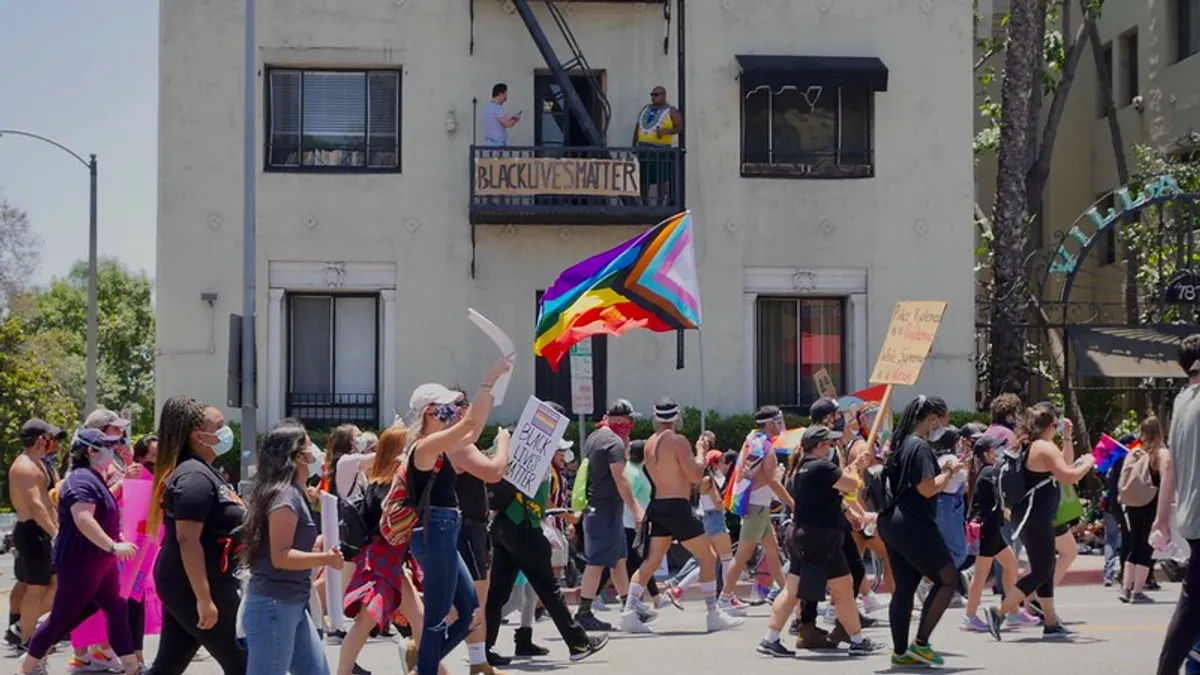Dive Brief:
- The Human Rights Campaign (HRC) released its ninth-annual Municipal Equality Index (MEI), a nationwide assessment of municipal policy and law inclusivity for LGBTQ people. The report found a record-breaking 94 of 506 U.S. cities achieved the maximum score for LGBTQ inclusion in 2020.
- The index ranks the various cities from every state based on 49 criteria that fall into five broad categories, according to MEI program head and HRC senior legislative counsel Xavier Persad: citywide non-discrimination laws; city policy for its own employees; city services; law enforcement and city leader’s public support for LGBTQ equality.
- Of the top-ranking 94 cities, 93 were found to report hate crime statistics to the FBI; 88 have an LGBTQ liaison for the city executive; 85 have contractor non-discrimination policies and 64 have a publicly LGBTQ elected or appointed senior leader.
Dive Insight:
Cities made headway this year on becoming more inclusive despite the year’s setbacks from the COVID-19 pandemic and racial violence, according to the report. The MEI’s national city score average jumped to an all-time high of 64 points out of 100, up from 60 points last year, marking the fourth consecutive year of national average increases.
Other highlights from the report include the 38 MEI-rated localities that have adopted anti-conversion therapy ordinances in states without state-level protections. And 103 MEI-rated localities are now required to provide single-user restrooms to people of all genders.
"My hope is that we see this trend continue and grow exponentially," Persad said. "City leaders are the closest elected representatives of the people and so the decisions that they make affect their neighbors, their families, the people they interact with every day... it’s vital that they take seriously their foremost duty of protecting the health, safety and well-being of every member of their community."
Local governments also made progress in creating more inclusive environments for city employees and contractors, according to the report.
For instance, there are 429 cities with equal employment opportunity policies that "expressly include" sexual orientation and/or gender identity, according to the MEI report, up by 21 cities over the past year. One hundred and seventy-nine of the MEI-rated cities also provide transgender-inclusive healthcare benefits for city employees, and 127 cities offer equal benefits to same- or different-sex domestic partners of city employees and their dependents.
And as city leaders gear up for a new calendar year with potentially strapped budgets due to COVID-19, there are a number of policy improvements that can be made regardless of varying levels of resources, according to Persad.
Those changes can include updating equal employment opportunity policies for municipal workers to expressly cover LGBTQ workers; ensuring that workers have access to transgender inclusive healthcare benefits in city health insurance plans; and encouraging businesses in the city to have similarly inclusive equal employment opportunity policies, Persad said.












